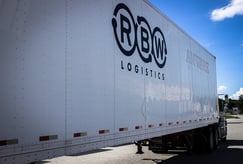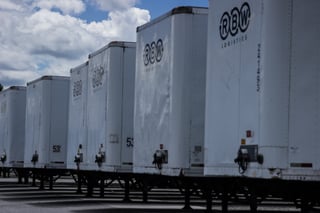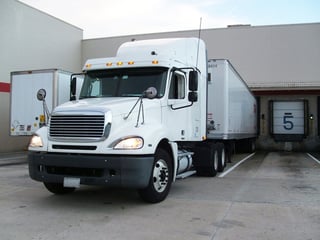Managing & Motivation Tips to Achieve High Performance (Part III)
Success is about achieving goals. Achieving goals is about having the right Goal-Achieving system in place. That sounds too obvious, but many...
4 min read
 Chadwick Heard
:
Updated on June 26, 2024
Chadwick Heard
:
Updated on June 26, 2024

"Victorious warriors win first and then go to war, while defeated warriors go to war first and then seek to win." - Sun Tzu, The Art Of War
If you think about it, the above quotation suggests that success and victory are often achieved before you even begin a task. The success comes from training. Success is achieved in your goals and your strategey. The lesson that Sun Tzu tries convey in The Art of War rings true not only in war, but in many facets of life. It's a philosophy that definitely rings true in transportation. The success and effectiveness of your company are often achieved through your preparation.
Transportation is probably the most challenging part of the logistics industry. So many variables affect this part of the business, which is also typically the most expensive end of the supply chain. Logistics professionals would also probably agree that transportation experiences the most Muda, or waste, in the supply chain. We came across an interesting article recently by Richard Koch, the Associate Director of Logistics Operations at Chainalytics, entitled Make Sure Your Freight Strategy Is Working Hard for You.
industry. So many variables affect this part of the business, which is also typically the most expensive end of the supply chain. Logistics professionals would also probably agree that transportation experiences the most Muda, or waste, in the supply chain. We came across an interesting article recently by Richard Koch, the Associate Director of Logistics Operations at Chainalytics, entitled Make Sure Your Freight Strategy Is Working Hard for You.
The article prompted us to ask this question:
Koch has over 30 years of industry experience, and the things that he's witnessed make the difference between a good transportation strategy and a mediocre one. Here's our perspective on what Koch has seen in Australia and how it can be applied to our market.
Excellence in financial management, efficient operations, and supply chain superiority all play important roles. Here are some key quotes from the piece, and our thoughts on their application.
"A well-defined transport strategy makes a big difference in your financial and operational results."
Like everything else in life and in business, your transportation strategy starts with a goal and a good plan. Due to the variable nature of transportation, this is even more crucial. With transportation you have to worry about the peaks and valleys in cost due to fuel fluctuations, weather, delays in traffic, regulation changes, political climate, and limitations due to discrepancies in technology between carriers. One of the most important aspects of transportation, and logistics in general, is the visibility in your supply chain. Where is your product? How do changes and unexpected occurances affect lead times and deliverables? If you have a solid plan in place, these unexpected situations can be reduced considerably. You'll also have a strategy in place to handle these situations when they arise.
"A successful transport strategy is not based on playing one carrier off against another to get the best rate."
 Yes, you want to get a good rate for your transportation, but price shouldn't always be the determinate. Reliability and quality should enter the equation as well. A good carrier will allow you to sleep soundly at night, without worrying about your product. A sub-par carrier can add unnecessary stress to your job, and, believe us, as logistics professionals, we don't need any added stress!
Yes, you want to get a good rate for your transportation, but price shouldn't always be the determinate. Reliability and quality should enter the equation as well. A good carrier will allow you to sleep soundly at night, without worrying about your product. A sub-par carrier can add unnecessary stress to your job, and, believe us, as logistics professionals, we don't need any added stress!
"Certainly we all aim to keep our customers happy. But finding the right balance between cost and service is key."
This is the "to be, or not to be?" question of the transportation and logistics industry. Do we treat all customers equally? It can be a tough question to answer. The philosophy of many of our companies is that customer retention comes first. But are all customers created equal?
The honest answer is no, and if that answer seems counterintuitive, ask yourself these questions.
Do all customers affect your business the same way?
Do all of your customers have the same needs?
Do all customers operate the same way?
No, no, and definitely no.
One could even make the argument that you don't operate a customer-centric company if each customer is treated exactly the same.
In order to provide value to your customer's supply chain, you need to understand their needs and expectations, and then execute accordingly. If you truly adhere to this principle, it's impossible to treat every company exactly the same.
This is only the impact on your customer, however. What about the impact on you?
Your business can also suffer if you treat every customer the same. This philosophy can lose you money. What happens when you incur multiple charges servicing a customer that exceeds the amount revenue you receive from them? You put yourself in a deficit. Examine your operations and account to ensure this doesn't happen. It's a great place to start when you're looking for cost savings, and should be incorporated in your transportation strategy.
"What exactly does your customer mean when they say they want “timely delivery?”... Notwithstanding the competitive nature of certain industries, most customers would prefer reliable, consistent, damage-free deliveries to more frequent service."
This concept returns to the notion that consistency and reliability regarding the needs and expectations of your customer should be focal point of your transporation operation.
Develop your strategy with this goal in mind. Continue to measure your operations and strategy against this goal. Incorporate this to find a sound, successful transportation strategy.
"Dividing your business among too many carriers does not work."
A huge part of this industry is building strong, strategic business relationships. If you divide your  business between too many carriers, how can you possibly build a strong business relationship? Truthfully, you diminish your leverage and negotiating power when you split up the business, since your carrier will be less likely to give your company cost breaks when you need them.
business between too many carriers, how can you possibly build a strong business relationship? Truthfully, you diminish your leverage and negotiating power when you split up the business, since your carrier will be less likely to give your company cost breaks when you need them.
"Carriers come and go, so it’s important to understand what is happening within each relevant transport mode and align your strategy with carriers who will still be viable in five years and with whom you have built solid relationships."
Sun Tzu's words come into play again here. Your victories begin with your preparation. Adjust to your surroundings and marketplace, or your business will fall behind.
"It is not a question of whether or not change happens, but rather how quickly. Your strategy has to be ready to change."
Don't be afraid of change. Embrace it. Plan for the unexpected, especially possible changes to the market. This is Sun Tzu's core philosophy. Be proactive - this minimizes unwelcome surprises that could impact your business.
Be smart. Be proactive. Be effective.

Success is about achieving goals. Achieving goals is about having the right Goal-Achieving system in place. That sounds too obvious, but many...

Everyone is motivated to achieve something. M1 types are motivated to achieve goals and bring about the future, M2 types are motivated to change the...

There is no "I" in team. It takes the contributions of a group of people to achieve great things, and warehousing is no different. You have...